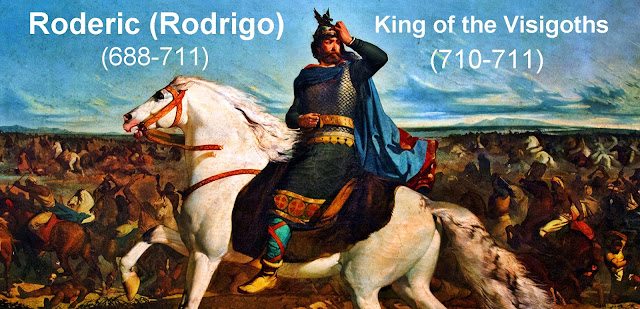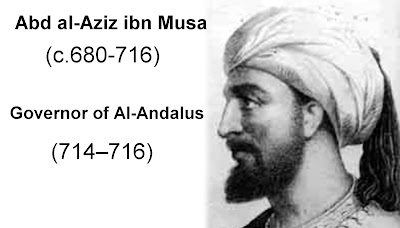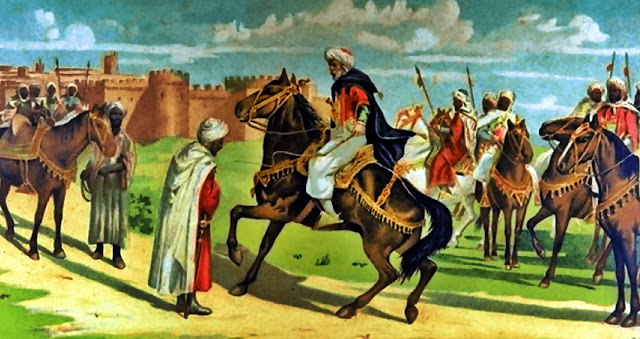Wednesday, April 5, 2023
Arab conquest of Spain (711-720)
The arab conquest of Spain was the initial expansion of the Umayyad Caliphate over Iberian Peninsula, beginning in 711. The conquest resulted in the destruction of the Visigothic Kingdom and the establishment of the independent Emirate of Cordova under Abd ar-Rahman I, who completed the unification of Muslim-ruled Iberia, or al-Andalus (756–788). The conquest marks the westernmost expansion of both the Umayyad Caliphate and Muslim rule into Europe.
After the fall of the Western Roman Empire in 476, the Teutonic tribe of Visigoths ended up ruling the whole peninsula until the Islamic conquest. During that time they pushed another Teutonic tribe out—the Vandals – and conquered another one—the Suevi. It is frequently stated in historical sources that Spain was one of the former Roman provinces where the Latin language and culture grew deep roots. After the fall of the Empire, the Visigoths continued the tradition by becoming probably the most Romanized of all Teutonic tribes.
On April 30, 711, muslim forces commanded by Tariq ibn Ziyad disembarked at Gibraltar, with an army consisting of Berbers, natives from north-western Africa.
According to the later chronicler Ibn Abd-el-Hakem, in 711, Tariq Ibn Ziyad led an approximately 1,700-strong raiding force from North Africa to southern Spain. However, 12,000 seems a more accurate figure. Ibn Abd-el-Hakem reports, one and a half centuries later, that "the people of Andalus did not observe them, thinking that the vessels crossing and recrossing were similar to the trading vessels which for their benefit plied backwards and forwards." They defeated the Visigothic army, led by King Roderic, in a decisive battle at Guadalete in 712. Tariq's forces were then reinforced by those of his superior, the wali Musa ibn Nusair, and both took control of most of Iberia with an army estimated at approximately 10,000–15,000 combatants.
The conquering army was made up mainly of Berbers who had themselves only recently come under Muslim influence. It is probable that this army represented a continuation of a historic pattern of large-scale raids into Iberia dating to the pre–Islamic period, and hence it has been suggested that actual conquest was not originally planned.
Both the Chronicle of 754 and later Muslim sources speak of raiding activity in previous years, and Tariq's army may have been present for some time before the decisive battle. It has been argued that this possibility is supported by the fact that the army was led by a Berber and that Musa, who was the Umayyad Governor of North Africa, only arrived the following year — the governor had not stooped to lead a mere raid, but hurried across once the unexpected triumph became clear. The Chronicle of 754 states that many townspeople fled to the hills rather than defend their cities, which might support the view that this was expected to be a temporary raid rather than a permanent change of government.
Roderic was believed to have been killed and a crushing defeat would have left the Visigoths largely leaderless and disorganized. In this regard, the ruling Visigoth population is estimated at a mere 1 to 2% of the total population, which on one hand led to a reasonably strong and effective instrument of government. However, it was highly centralised to the extent that the defeat of the royal army left the entire land open to the invaders. The resulting power vacuum, which may have indeed caught Tariq completely by surprise, would have aided the Muslim conquest immensely. Indeed, it may have been equally welcome to the Hispano-Roman peasants who were disillusioned by the prominent legal, linguistic and social divide between them and the 'barbaric' and 'decadent' Visigoth royal family.
In 714, Musa ibn Nusayr headed north-west up the Ebro river to overrun the western Basque regions and the Cantabrian mountains all the way to Gallaecia, with no relevant or attested opposition. During the period of Arab governor Abd al-Aziz ibn Musa (714–716), the principal urban centres of Catalonia surrendered. In 714, his father, Musa ibn Nusair, advanced and overran Soria, the western Basque regions, Palencia, and as far west as Gijón or León, where a Berber governor was appointed with no relevant or attested opposition. The northern areas of Iberia drew little attention to the conquerors and were hard to defend when taken. The high western and central sub-Pyrenean valleys remained unconquered.
At this time, Umayyad troops reached Pamplona, and the Basque town submitted after a compromise was brokered with Arab commanders to respect the town and its inhabitants, a practice that was common in many towns of the Iberian Peninsula. The Umayyad troops met little resistance. Considering that era's communication capabilities, three years was a reasonable time spent almost reaching the Pyrenees, after making the necessary arrangements for the towns' submissions and their future governance.
The conquest was followed by a period of several hundred years during which most of the Iberian peninsula was known as Al-Andalus, dominated by Muslim rulers. Only a handful of new small Christian realms managed to reassert their authority across the faraway mountainous north of the peninsula.








